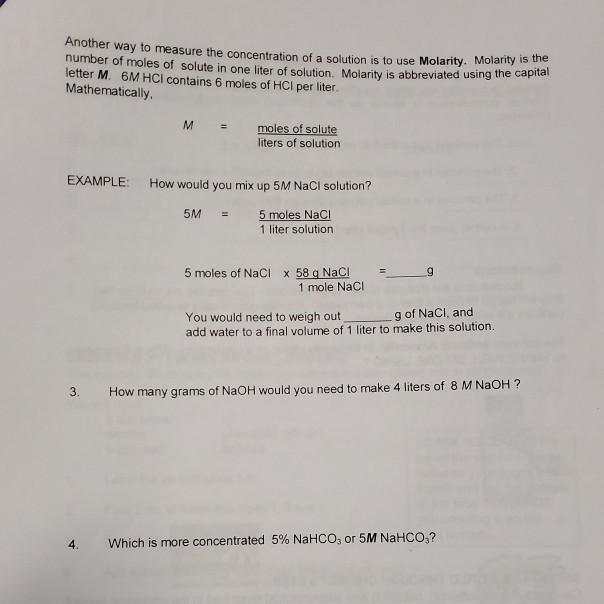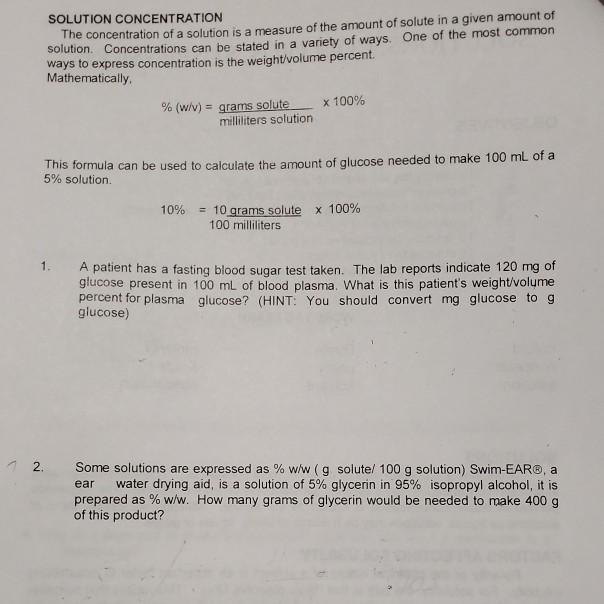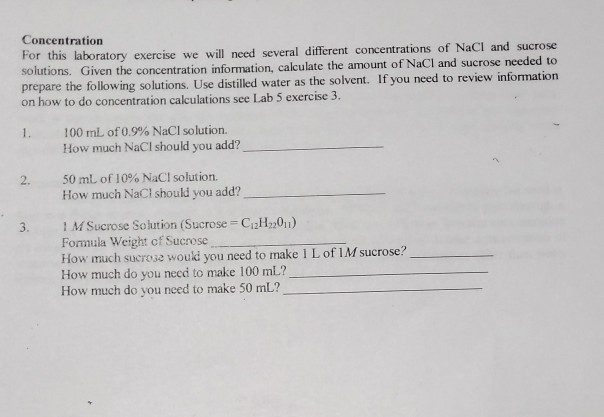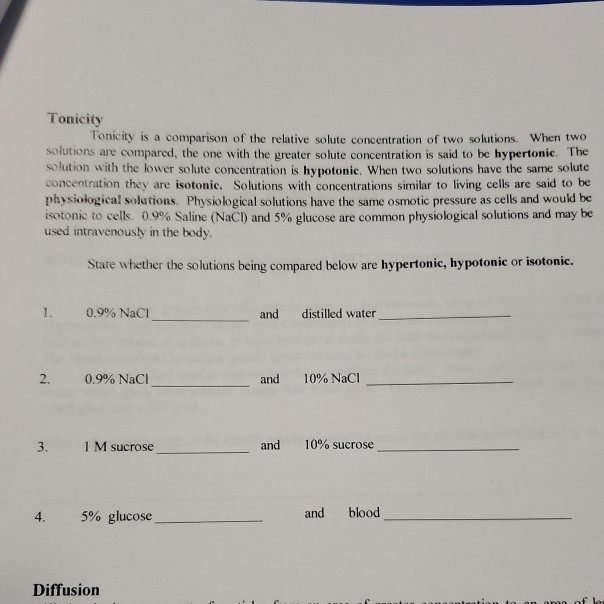Answered step by step
Verified Expert Solution
Question
1 Approved Answer
Another way to measure the concentration of a solution is to use Molarity. Molarity is the number of moles of solute in one liter




Another way to measure the concentration of a solution is to use Molarity. Molarity is the number of moles of solute in one liter of solution. Molarity is abbreviated using the capital letter M. 6M HCI contains 6 moles of HCI per liter Mathematically, M = moles of solute liters of solution EXAMPLE: How would you mix up 5M NaCl solution? 5M = 5 moles NaCl 1 liter solution 5 moles of NaCl x 58 q NaCl 1 mole NaCl You would need to weigh out g of NaCl, and add water to a final volume of 1 liter to make this solution. 3. How many grams of NaOH would you need to make 4 liters of 8 M NaOH? Which is more concentrated 5% NaHCO3 or 5M NaHCO3? SOLUTION CONCENTRATION The concentration of a solution is a measure of the amount of solute in a given amount of solution. Concentrations can be stated in a variety of ways. One of the most common ways to express concentration is the weight/volume percent. Mathematically. = % (w/v) grams solute milliliters solution x 100% This formula can be used to calculate the amount of glucose needed to make 100 mL of a 5% solution. 1. 10% 10 grams solute x 100% 100 milliliters A patient has a fasting blood sugar test taken. The lab reports indicate 120 mg of glucose present in 100 mL of blood plasma. What is this patient's weight/volume percent for plasma glucose? (HINT: You should convert mg glucose to g glucose) 12. Some solutions are expressed as % w/w (g solute/ 100 g solution) Swim-EAR, a ear water drying aid, is a solution of 5% glycerin in 95% isopropyl alcohol, it is prepared as % w/w. How many grams of glycerin would be needed to make 400 g of this product? Concentration For this laboratory exercise we will need several different concentrations of NaCl and sucrose solutions. Given the concentration information, calculate the amount of NaCl and sucrose needed to prepare the following solutions. Use distilled water as the solvent. If you need to review information. on how to do concentration calculations see Lab 5 exercise 3. 1. 3. 100 mL of 0.9% NaCl solution. How much NaCl should you add? 50 mL of 10% NaCl solution. How much NaCl should you add? 1 M Sucrose Solution (Sucrose C12H22011) Formula Weight of Sucrose How much sucrose would you need to make 1 L of 1M sucrose? How much do you need to make 100 mL? How much do you need to make 50 mL? Tonicity Tonicity is a comparison of the relative solute concentration of two solutions. When two solutions are compared, the one with the greater solute concentration is said to be hypertonic. The solution with the lower solute concentration is hypotonic. When two solutions have the same solute concentration they are isotonic. Solutions with concentrations similar to living cells are said to be physiological solutions. Physiological solutions have the same osmotic pressure as cells and would be isotonic to cells. 0.9% Saline (NaCl) and 5% glucose are common physiological solutions and may be used intravenously in the body. State whether the solutions being compared below are hypertonic, hypotonic or isotonic. 1. 0.9% NaCl and distilled water 2. 0.9% NaCl and 10% NaCl 3. 1 M sucrose and 10% sucrose 4. 5% glucose Diffusion and blood
Step by Step Solution
There are 3 Steps involved in it
Step: 1
3 To make 4 liters of 8 M NaOH solution we first calculate the moles of NaOH needed Molarity M moles ...
Get Instant Access to Expert-Tailored Solutions
See step-by-step solutions with expert insights and AI powered tools for academic success
Step: 2

Step: 3

Document Format ( 2 attachments)
663e49dedd82f_958660.pdf
180 KBs PDF File
663e49dedd82f_958660.docx
120 KBs Word File
Ace Your Homework with AI
Get the answers you need in no time with our AI-driven, step-by-step assistance
Get Started


